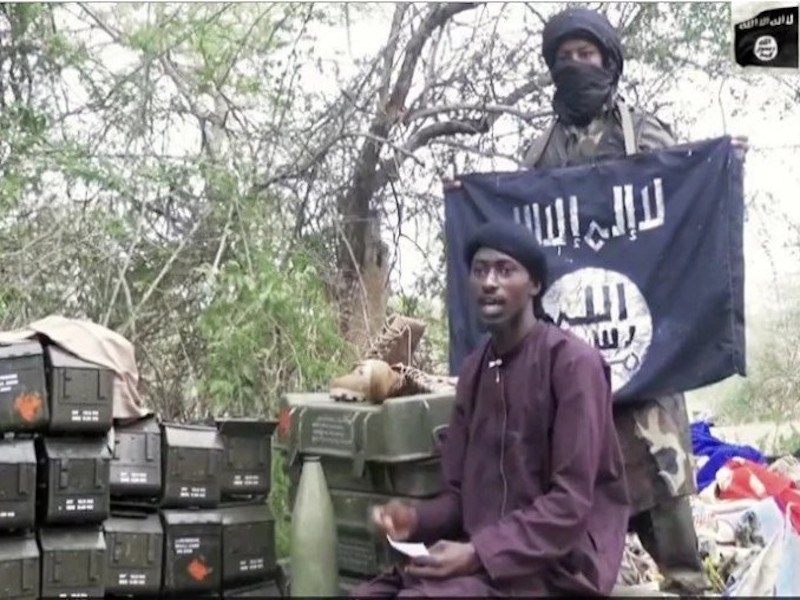There are no products in your shopping cart.
| 0 Items | £0.00 |


MILITARY sources in northeast Nigeria have indicated that the leader of the notorious terrorist sect the Islamic State West Africa Province (Iswap) Abu Musab Al-Barnawi has been killed in Borno State.
According to several sources, Al-Barnawi, the son of Boko Haram founder, Mohammed Yusuf who was also killed by security forces in 2009 was killed in a recent clash with the military authorities. In 2016, Islamic State announced Al-Barnawi as the leader of its West African affiliate, which had broken away from Boko Haram, after it members fell out with its leader Abubakar Shekau.
Shekau took over as the group’s leader after the death of Mohammed Yusuf and had sworn allegiance to Islamic State in March 2015 but the group later split. Islamic State however, opted to recognise Al-Barnawi as leader in the Lake Chad region to punish Shekau who reportedly violated all known norms and to also retain the confidence of Boko Haram fighters who were loyal to his father, Yusuf, amid threats from other factional groups.
Eventually, the two factions clashed in August this year when Iswap fighters attacked Shekau's camp and he blew himself up to avoid capture. However, nobody has produced Shekau's remains, shown photographs of his corpse or provided details of where he was buried so far.
Now, it is being rumoured that with the death of Al-Barnawi, the insurgency in northeast Nigeria might be coming to an end. There are two versions of the story of Al-Barnawi’s death with one saying he was killed by Nigerian troops and the other version saying he died during a rival war within the Iswap camp.
Some sources say he was ambushed by troops during which four or five top Iswap leaders and many foot terrorists loyal to him were also killed around Bula Yobe, a community near the Borno/Yobe states border along Mobbar and Abadam axis that leads to the Lake Chad area. However, a different source said he was ambushed and killed at a place that could be accessed from Yale, Bama, Banki junction through the Kashimbri-Gulumba.
Other sources say it was the leadership tussle that led to the death of Al-Barnawi as the battle of supremacy climaxed between August 14 and 26 and the ensuing fight claimed many commanders on both sides. Yet, another source said the other camp had mobilised some terrorists from Central Africa to overthrow Al-Barnawi and they succeeded.
Major General Benjamin Sawyer, the director of defence information has declined to confirm or deny the story. Chukwuma Ume, security sector reform expert, said the implications of the killing of Al-Barnawi on counter-insurgency, would have both positive and negative effects on the country.
He added: “We are trying to focus as a nation and are trying to up our game in terms of dealing with the issue of terrorism and insurgency. In as much as many people may want to say it is a welcome development, it shows that our military is waging this war seriously as we expect them but some of us will still think that a unilateral output, in this case, the use of force, may also not be the entire solution or a comprehensive solution that is required.
“This is not to take away anything from the Nigerian military. This is not to take anything away from our men and women out on the field but we are also calling on the government to be a bit more proactive in the sense that the issues leading to this insurgency, terrorism or violent extremism should be dealt with.
“It needs a more holistic approach or integrated approach. Where there are structural imperfections or imbalance, where there are issues of exclusivity, where people feel that the quality of the life they live is on the defensive, the government should endeavour to provide these social contracts, especially those who are hitherto disadvantaged to become inclusive and to also have equitable distribution of source of livelihood.
“Yes, it is good that we seem to be winning the war but at the same time we need to start addressing those issues that gave rise in the first instance to insurgency.”
Earlier this year, Al-Barnawi has released a 28 minute audio message in Kanuri language confirmed the death of Shekau and the triumph of his faction. In it he said: “He (Shekau) never thought this would happen to him even in his dream but by the power of God, we destabilised him.
“He became confused and fled to the forest where he spent five days, wandering and stranded. We followed him again where we faced him with heavy fire and he ran away. Then our troops called on him to surrender so that he would be punished.
"We kept assuring him that we were not out to kill him but he was adamant and confused. As a cantankerous fellow, he believed it was better for him to die than to surrender when he observed that the Iswap fighters wanted to capture him alive.”